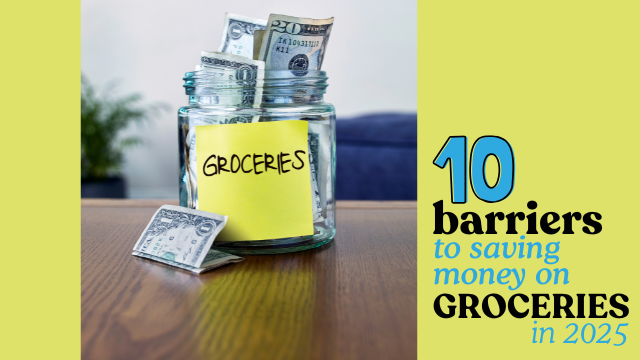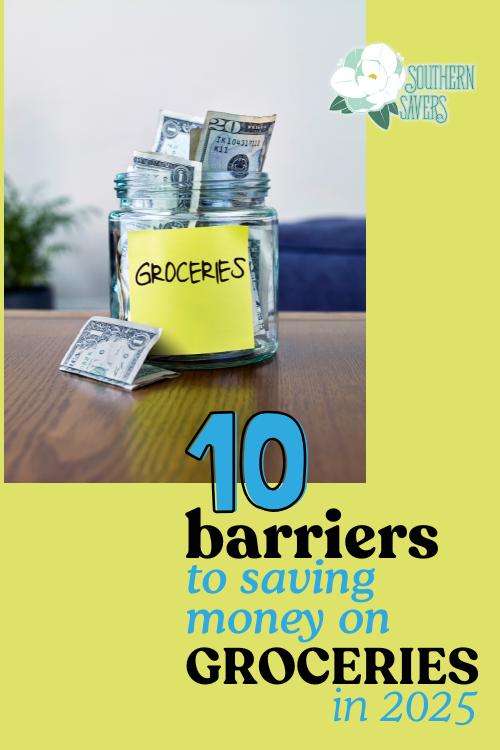This post may contain affiliate links. Read our disclosure here.

No matter who you are, you have to buy groceries (unless you’re one of the rare people who lives on a completely self-sustaining homestead!). Most of us are looking for ways to save money each month, and your grocery spending might be something you can reduce. However, the solution is not necessarily to buy fewer groceries. You might just need to overcome one of these 10 barriers to saving on groceries. Even addressing one of these barriers could make a different in how much you’re spending each month.
10 Barriers to Saving on Groceries in 2025
Lack of planning
The best way to save on groceries is to have a plan. Even if you never use coupons or never shop sales, you will save money if you go in with a plan. This can be as complex as you want it to be. It could just be a list of what you need, having looked at what you already have in your pantry and fridge. You could make a list of the things that are on sale that week that you want to stockpile. You might make a note next to certain items you have a coupon for so that you don’t forget to use your coupons.

Vague grocery budget
Sometimes the word “budget” gets a bad rap, but a budget is really just a plan for how you want to use your money. You get to decide what the budget is, and you can change your budget based on what is going on in your life. Knowing how much you have to spend on groceries can help you determine how much you can spend on impulse purchases or building up your stockpile. If you are trying to spend $800/month on groceries, you can plan to spend $200/week. If you only spend $150, maybe you can spend that other $50 on the meat that is on sale, even if you don’t need it yet.
Failing to track your spending
Hopefully you’ve come up with a budget. But it won’t help you at all if you don’t track your spending. Whether it’s through an app or just good ol’ pen and paper, you’ll never know if you’re sticking to your budget if you don’t track it!
Impulse buys
Impulse buys are the quickest way to spend more than you want. I find that I am more likely to make impulse buys if 1) I don’t have a list, 2) I’m hungry, or 3) I have other family members with me. If you find that impulse buys are unavoidable for you, then consider setting a budget for each store trip (say, $10 or $15) that you will allow for items not on your list.

Wasting food and / or overbuying
You’ve gotten great deals on groceries, used your coupons, and you’re tracking your spending. Great job! Now you need to actually use the food you bought. Waste can happen with produce but also with leftovers. Make sure you pay attention to the state of the produce you buy and also that you find ways to keep leftovers foremost in your mind. Using see-through containers or keeping a list of leftover options on the fridge can help with this.
Buying in bulk
Sometimes buying in bulk can help you save. However, especially if you’re shopping at the bulk warehouse stores, you might be buying too much in bulk. It can be hard to get out of Costco without spending $300. Even if you’re only buying things that are a good deal, that could be a big chunk of your grocery budget for the month. Buy in bulk sparingly, making sure you’re not buying things that will go bad or expire before you use them.
Burnout
It’s important to spend time planning if you’re trying to save, but it’s possible to spend too much time. If you dive too deeply into couponing and saving and get burned out, then you’ll give up altogether. If you need to, set a time limit on how much time you’ll spend making your list so you don’t go overboard.

Shopping at multiple stores
It’s not wrong to shop at more than one store, but you can take it too far. Your time has value, too. Make sure to find the right balance between getting good deals driving all around town.
Brand loyalty
If you are too stuck on certain brands, you’ll struggle to save money. Stores like Aldi have a money-back guarantee if you don’t like something, so why not try their store brand and see how it compares to your favorite?
Unrealistic expectations
You’re not going to save 60% on your groceries every week. Remember that it’s not all or nothing. Some weeks you won’t have time to plan and you’ll spend more than you want. Some weeks your kids might be sick and you have to buy some specialty items or you focus on more expensive convenience foods. Even small changes each week will add up over the course of the year. Be proud of yourself for saving on groceries, no matter how small the amount!
Need more ideas? See 7 easy ways to save money in 2025!



